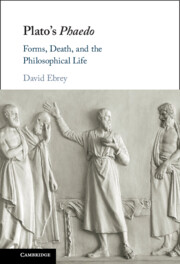Book contents
- Plato’s Phaedo
- Plato’s Phaedo
- Copyright page
- Dedication
- Contents
- Acknowledgments
- Introduction
- 1 The Characters
- 2 The Phaedo as an Alternative to Tragedy and Socrates as a Poet
- 3 Defense of the Desire to Be Dead
- 4 Cebes’ Challenge and the Cyclical Argument
- 5 The Recollecting Argument
- 6 The Kinship Argument
- 7 The Return to the Defense
- 8 Misology and the Soul as a harmonia
- 9 Socrates’ Autobiography
- 10 Cebes’ Objection and the Final Argument
- 11 The Cosmos and the Afterlife
- 12 The Death Scene
- Bibliography
- Index Locorum
- Index
2 - The Phaedo as an Alternative to Tragedy and Socrates as a Poet
57a–61c
Published online by Cambridge University Press: 02 February 2023
- Plato’s Phaedo
- Plato’s Phaedo
- Copyright page
- Dedication
- Contents
- Acknowledgments
- Introduction
- 1 The Characters
- 2 The Phaedo as an Alternative to Tragedy and Socrates as a Poet
- 3 Defense of the Desire to Be Dead
- 4 Cebes’ Challenge and the Cyclical Argument
- 5 The Recollecting Argument
- 6 The Kinship Argument
- 7 The Return to the Defense
- 8 Misology and the Soul as a harmonia
- 9 Socrates’ Autobiography
- 10 Cebes’ Objection and the Final Argument
- 11 The Cosmos and the Afterlife
- 12 The Death Scene
- Bibliography
- Index Locorum
- Index
Summary
This chapter argues that Plato wrote the Phaedo so that we would see Socrates as a philosophical hero, a replacement for traditional heroes such as Theseus or Heracles. The dialogue tells a new sort of story of how a hero faces death, providing an alternative to tragedy, as Plato thought that tragedy was actually practiced. I discuss the topic here because the opening of the dialogue plays an important role in setting up the Phaedo as an alternative to tragedy. But my case’s strength comes from cumulative evidence drawn from across the dialogue, and so this chapter provides an overall reading of the dialogue as an alternative to tragedy. After arguing for this, I turn to two other ways in which storytelling arises in the opening of the dialogue: in Socrates’ Aesop fable and in his dream that tells him to compose poetry.
- Type
- Chapter
- Information
- Plato's PhaedoForms, Death, and the Philosophical Life, pp. 28 - 53Publisher: Cambridge University PressPrint publication year: 2023

